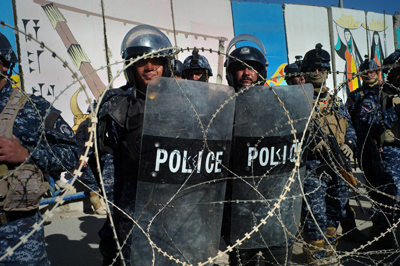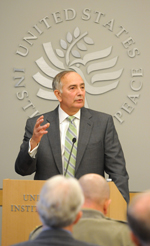Training Iraqi Police: Lessons Learned from the Field
The United States Institute of Peace (USIP) and the Institute for the Study of War co-hosted a critical lessons learned forum on policing in Iraq moderated by Robert Perito, director of USIP's Security Sector Governance and author of the new Special Report, “The Iraq Federal Police: U.S. Police Building Under Fire.”

Police establish a barrier outside a government office in Baquda, Iraq, Dec. 19, 2011. Security was increased on the streets of Baquba to curb any violence that could result from the Shiite-led government's efforts to arrest the Sunni vice president, Tariq al-Hashimi, just days after the US military withdrew from Iraq. (Michael Kamber/The New York Times)
February 29, 2012
The United States Institute of Peace (USIP) and the Institute for the Study of War co-hosted a critical lessons learned forum on policing in Iraq moderated by Robert Perito, director of USIP's Security Sector Governance and author of the new Special Report, “The Iraq Federal Police: U.S. Police Building Under Fire.” The program took place in the wake of recent violence including a February 19th suicide car bombing that killed a number of Iraqi police recruits.
The forum was held just one day after Secretary of State Hillary Clinton testified before the Senate Foreign Relations Committee, reminding Congress and the American people that “After so much sacrifice in Iraq, we have a chance to help the Iraqi people build a stable, democratic country in the heart of the Middle East. As troops come home, our civilians are taking the lead, helping Iraqis resolve conflicts peacefully and training police.”
 The forum chronicled U.S. efforts over the past eight years to train and equip an indigenous Iraqi constabulary force to control insurgent and militia violence, including work by USIP on police training. USIP maintains an overseas presence in Baghdad and works through its programs and Academy to assist in training programs. Perito reminded the audience of the monumental challenges that Iraq presented in 2003 and how, over the following eight years, $8 billion was spent to train an indigenous police force under fire.
The forum chronicled U.S. efforts over the past eight years to train and equip an indigenous Iraqi constabulary force to control insurgent and militia violence, including work by USIP on police training. USIP maintains an overseas presence in Baghdad and works through its programs and Academy to assist in training programs. Perito reminded the audience of the monumental challenges that Iraq presented in 2003 and how, over the following eight years, $8 billion was spent to train an indigenous police force under fire.
The USIP forum included General Jim Dubik (U.S. Army, ret., pictured), who served as former commander of the Multi-National Security Transition Command in Iraq, Ginger Cruz, former deputy Inspector General of the Special Inspector General for Iraq Reconstruction (SIGIR) and Dr. Austin Long, assistant professor at Columbia University School of International and Public Affairs.
Among the highlights of the program and the lessons learned since 2003:
- The need for embeds from the Department of State and the Department of Justice when building police capacity
- The need to balance out security ministerial training with development of rule of law
- The need for more trainers and earlier commitments of funds at the start of an intervention like Iraq
- Addressing the conflict between military and policy and correctly judging policy capacity and the degree to which it is even feasible to have community policing before you have established national training and security
- The vital need for crowd control, looting control, border control and fundamental leadership training
Explore Further
- Learn more about the event
- Read the report, "The Iraq Federal Police: U.S. Peacebuilding Under Fire"
- Learn about the upcoming Academy course on stabilization and peacebuilding (March 12-16, 2012)



